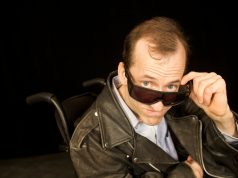I referred to myself as an activist in a conversation recently. I’m not sure the word is a fair descriptor.
About six years ago, I was in that phase of “early career” as a director/performer when I had more downtime than gigs, and I started to question my choice of career. I started putting up inspirational post-it notes in my room and writing in a journal to fight off impending depression. And then I thought (selfishly), maybe if I stop worrying about my own problems and start helping others, this existential crisis thing will fade.
The next week I was volunteering at the Downtown East side Women’s Centre, in their day centre helping with lunch service. Within a year, I found myself on staff working the night shift in their low barrier night shelter as a support worker.
I didn’t last long at the night shelter. I “took the pain inside,” as one of my coworkers put it. But it changed me.
Around that same time, I read Shaw’s Mrs. Warren’s Profession. It made me angry that he was writing about the same institutionalized misogyny and sexism that I was seeing in my own community over 120 years later. I started to research sex trade law in Canada and found out that our legal system, rooted in keeping prostitution out of the public eye, was forcing workers underground, thus risking their safety and endangering their lives.
In 2014, I staged a post-modern adaption of Mrs. Warren’s Profession at a local punk music venue in Vancouver’s downtown eastside. The Supreme Court had recently struck down a few major federal sex trade laws, deeming them unconstitutional. The government had been given a year to come up with a new set of laws so the piece felt extremely timely.
I wanted the public to come down to Main and Hastings, feel the vibe of that neighbourhood, and maybe understand their own complicities in the capitalist machine that allows our community’s women to go missing and murdered.
And I wanted them to witness this seemingly historical drama for what it was: a piece of deeply truthful and articulate political rhetoric that was highly relevant to our times.
We held post-show panel discussions with local advocates, donated a portion of tickets to two local organizations supporting and advocating for sex worker rights (Wish Drop-In Centre and PACE Society), and hosted an interactive website (www.mrswarrens.ca) where you could learn more about our local sex trade through mini documentaries. We even had the audience dialogue with the show’s themes through smart phone texting projected anonymously onto our preshow curtain.
I wrote to my local MP and posted regularly online to spread the word about how our laws were affecting these women’s lives. I felt this sense of accomplishment like I was opening people’s minds or something… And maybe I did. But was that enough? Does that qualify as activism?
Shortly after the project wrapped, the federal government revealed its plans to implement the “Nordic model” making it illegal to buy sex but legal to sell sex. This is a paradoxical system in which the sex worker is again put at risk by having to take her business underground to attract clients. Studies have shown that this system actually increases criminal activity and violence against sex workers.
When the news about the government’s decision broke, I felt empty and helpless – and I gave up. I haven’t been back in touch with WISH and PACE and my Facebook posts about the cause have slowed down. I’ve moved on… to other issues. The year after Mrs. Warren’s it was climate change with Jordan Hall’s Kayak, and then social services with Hannah Moscovitch’s Little One, and now First Nations reclamation with Quelemia Sparrow’s O’wet/Lost Lagoon.
Sometimes I wonder what would have happened if I’d pushed through my helpless feelings and continued to cultivate a community dialogue on sex work. Would I have created social change? Would I have burnt out?
I’ll never know because I’m not an activist. I’m an artist. Albeit a politically and community-engaged artist, but right now I’m only an artist. I interpret, question, and maybe sometimes even evoke… but I don’t actually do that much about the issues I bring up. And I’m very lucky to be that position. I think it’s important to make that distinction, and I think humility is a highly underrated quality in this profession. We need to start giving more props to those doing the real work out there or we risk losing touch with our audience.
That’s not to say that I don’t believe in the power of theatre to create change. When I was in grade five, I saw my first Green Thumb Theatre show about literacy and dyslexia. At the time, I was really struggling with reading and that show had a huge impact on me. It didn’t make me want to become a theatre artist – that came later. But it inspired me to fight through my disability and learn to read. I don’t know if those Green Thumb actors were activists but they did create change in me somehow. What’s the word for that? I’d like that title someday.









